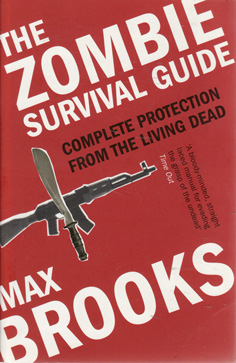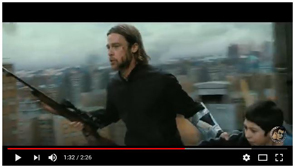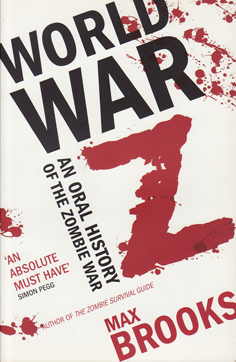

Complete Protection from the Living Dead
- Category:Alternative History
- Date Read:15 December 2017
- Pages:254
- Published:2004

Max Brooks’s The Zombie Survival Guide is exactly what the title purports; a guide book covering all manner of information and advice about surviving in a world in which zombies are real. The book outlines information about zombies – their physiological strengths and weaknesses, information on the virus which creates them, how it is spread and zombie behaviour – as well as how to cope with the threat of zombies. Brooks meticulously and systematically outlines his information with a credible tone, with illustrations and detail. He covers everything from levels of infestation, suitable weapons and other equipment like cars and kinds of boats to use, as well as strategies for short term and long-term survival in a world inhabited by zombies.
All this is fanciful and might seem rather pointless given that zombies do not exist (Brooks’s narrative will provide you with reasons why you simply don’t know about their existence – government coverups is only one explanation given) but the book is entertaining, and there seems to be some serious points to make along the way, even if it is all tongue in cheek.
But before considering what his point might be, it is worth discussing the form of the book. Much of the book is a how-to guide which appears deceptively banal at points. Brooks is willing to risk his audience with tedious lists of equipment, for instance, for the sake of verisimilitude. A lot of the text concerns itself with the minutiae of preparation, of assessing risks and evaluating personal and team strengths. His approach has the potential to alienate his audience except that what he writes is so morbidly fascinating. You end up buying the premise that zombies are real. The dead walk among us
he opens, and from that point on any reader worth their salt should be carried by Brooks’s authoritative tone.
The last section of the book offers a timeline of supposed zombie incidents throughout history, beginning with archaeological evidence as far back as 60,000 years ago, and from an Egyptian tomb, all the way through to cases in the early twenty first century. Having convincingly implied a world inhabited by zombies, Brooks now outlines various cases and circumstances, some of them connected, and also offers reasons why knowledge of zombie attacks has been suppressed or misunderstood in modern times. The cases also illustrate the wisdom of some of the advice given for survival in previous sections of the book. In fact, there is a tacit understanding that much of the survival knowledge has been drawn from a study of these cases.
Such is the authority with which Brooks writes that I found myself wondering whether Brooks had used real historical incidents and people, and tweaked them to his purpose. I actually did online searches for several cases mentioned. However, all of them turned out to have no basis in reality, except if you referred to Zombiepedia, then it all became real and true.
This final section is most like Brooks’s sequel World War Z, which documents the zombie outbreak that The Zombie Survival Guide anticipates. But I have to be honest, as much as I like The Zombie Survival Guide, it is to World War Z what The Hobbit is to The Lord of the Rings; a fun introduction and worthy of a read, but coming nowhere close to the complexity or intelligence of its sequel. I read World War Z a number of years ago. It was one of the most intelligent science fiction books I have read and offered a grim vision of our future if any disease becomes virulent and uncontrollable in reality. Brooks’s World War Z imagines a plague-like world in which the disease walks and has teeth, and in which our modern assurances are stripped bare. The Zombie Survival Guide edges towards this vision, particularly in the latter part of the book, but World War Z was Brook’s truly inspired work and the one I would most recommend if you felt like you only had time or energy for one book.
However whimsical the premise of The Zombie Survival Guide may be, it still manages to make some serious points along the lines of World War Z. Brooks points out that the examples from his book are predominantly from America, although its tactics and strategies apply to survival-minded humans everywhere.
Yet it is hard to imagine that much of what this book has to say isn’t directed at Americans, or worse, about Americans. I was reminded of the television show, Doomsday Preppers, about people who live their lives preparing for the apocalypse, whatever form that might take. Right from the start, this book seems to be a parody of the kind of manual that might be favoured by people of this mindset.
Brook’s parodic intentions were also evident in his evaluation of appropriate weapons against zombies. Is there anything to be read into his advice that the biggest guns are not always the best? I remember watching a comedian on Netflix tell his American audience that he thought a .22 was best for home defence. He was met with a roaring laugh of derision. Yet Brooks also outlines the limited value of a .22 rifle while talking about limitations of higher end weapons: excessive sound that would draw zombies closer; the wastefulness of semi- and automatic weapons; the difficulty of getting ammunition. Surely, when Brooks paraphrases Charlton Heston in his role as president of the NRA, is he not making a point about guns?: Never forget that many dismembered, half-eaten corpses have been discovered with these wonder weapons still clutched in their cold, dead hands.
Brooks advice to his purported preppers for the sacrifices that will need to be made to survive long term seem aimed at the plenitude of modern life and its fragility, divorced as it is from simplicity and tradition:
Look around your home. How many items have been manufactured within ten, fifty, even a hundred miles of it? Our way of life, particularly as members of the richest industrialised nation on earth, requires a delicate network of transportation and communication to exist. Remove that network, and we are reduced to a standard of living reminiscent of medieval Europe.
And in another criticism of America’s priorities, he chooses to make comments about the underfunded school system:
Unfortunately for our society but fortunately for a zombie siege, inner-city schools have taken on a fortress-like atmosphere. Not only are the buildings themselves built to withstand a riot, but chain-link fences surrounding them make these halls of education look more like military compounds… Often, a school is your best bet – perhaps not for education but certainly for protection from the undead.
And he has something to say about the hubris encouraged by consumerism. When evaluating the best cars for the apocalypse (and it’s not entirely certain you should be considering a car, either), Brooks says of the American SUV:
Research your options carefully so you can tell these genuine models from the gas-guzzling, aesthetically engineered, irresponsibly marketed vanity pieces.
And later:
Always keep in mind how spoiled Americans are in comparison to the rest of the planet.
The American way is the way of individual freedom. Self-sufficiency and individual capital drive much of the American mindset, while much of what this book is about, however, is the notion of planning, patience and cooperation in order to survive. The book’s recommendations fly in the face of the American myth of the individual. As Brooks states:
. . . in Western – particularly American – culture, there is the myth of the individual superbeing. One man or woman, well-armed and highly skilled, with nerves of steel, can conquer the world. In truth, anyone believing this should simply strip naked, holler for the undead, then lay down on a silver platter.
The individual superhero is the premise of thousands of American films. And not just the obvious superhero flicks being produced by Marvell and DC Comics, but in nearly every film about conflict. Such is the irony that Brooks’s World War Z, when adapted for the screen by Marc Forster, did not reflect the polyphonic tone of the book, its breadth and complexity, but became the story of one man
who against the odds in a world of deception/fear/danger/darkness/zombies [take your pick or insert your own]
saves the world. The script is standard for many film trailers (although not explicitly used in the World War Z trailer – not said, at least).
Brooks’s books are better than that, even this one, which is not as accomplished as its successor. But it still has something to say about modernity, about America and our future, and it’s a great introduction to Brooks’s sequel. So, yeah, read it before dead hands come to beat down your door.



No one has commented yet. Be the first!